Facilitating Learning: Healthcare Induction and Training Report
VerifiedAdded on 2023/01/13
|18
|4882
|34
Report
AI Summary
This report, submitted by a student and available on Desklib, details the induction process and learning opportunities within a Continuing Healthcare Team. The author, a Band 7 Review Nurse Manager, describes the induction of new learners, including welcome procedures, available resources, and the roles of various team members. The report analyzes the facilitation of learning for Band 6 nurses and nursing students, covering learning theories such as behaviorism, cognitivism, and constructivism. It outlines a comprehensive learning plan, encompassing needs assessment, goal setting, diverse learning styles, evaluation, and communication strategies. The report also discusses practical aspects of learning, including resource utilization, contextual environments, and techniques like compare/contrast and critical thinking facilitation. Positive and negative impacts of the learning plan are considered, highlighting the importance of continuous improvement in healthcare training and professional development. The report emphasizes the crucial role of communication and collaboration to enhance the learning experience for both educators and learners.
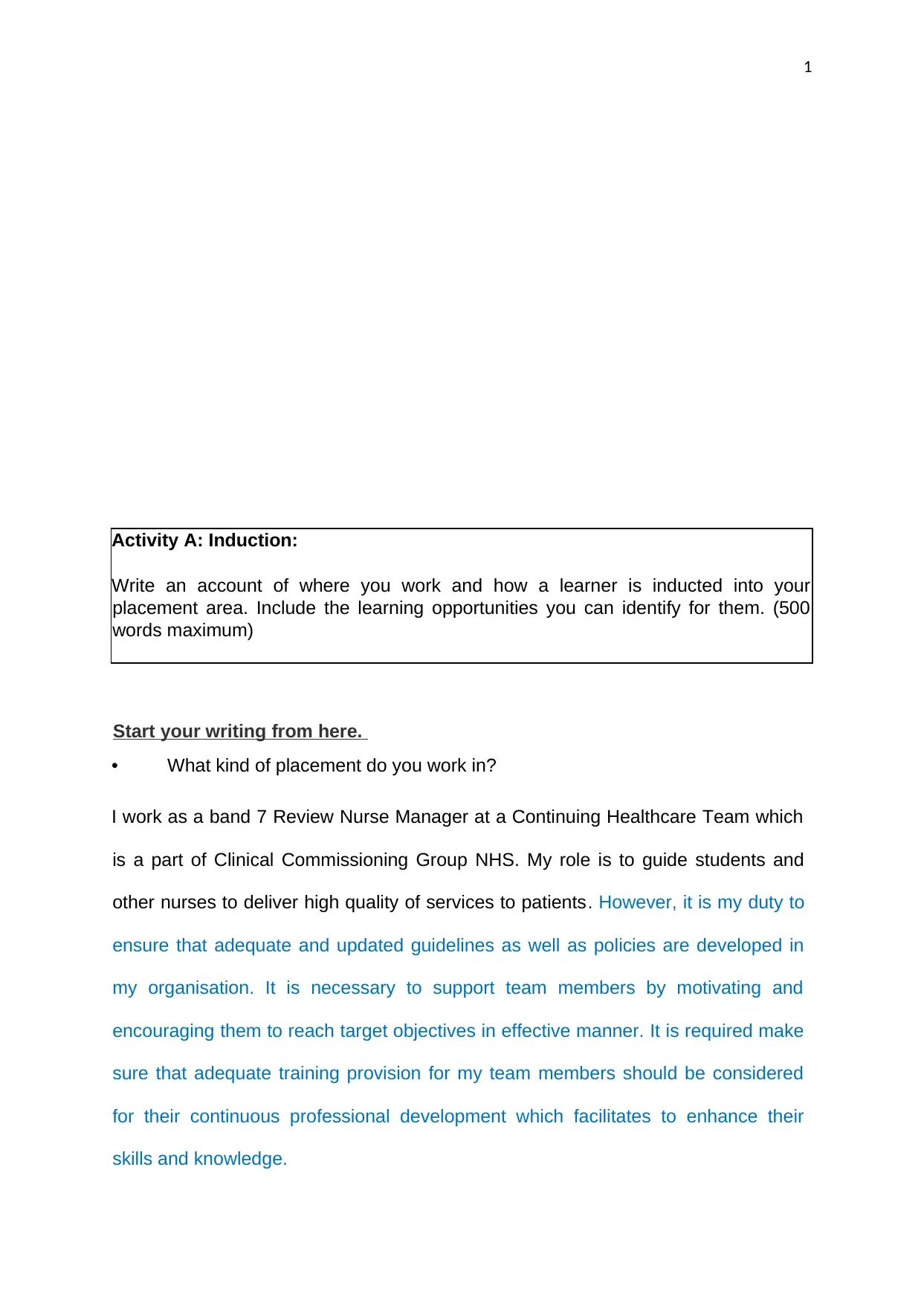
1
Activity A: Induction:
Write an account of where you work and how a learner is inducted into your
placement area. Include the learning opportunities you can identify for them. (500
words maximum)
Start your writing from here.
• What kind of placement do you work in?
I work as a band 7 Review Nurse Manager at a Continuing Healthcare Team which
is a part of Clinical Commissioning Group NHS. My role is to guide students and
other nurses to deliver high quality of services to patients. However, it is my duty to
ensure that adequate and updated guidelines as well as policies are developed in
my organisation. It is necessary to support team members by motivating and
encouraging them to reach target objectives in effective manner. It is required make
sure that adequate training provision for my team members should be considered
for their continuous professional development which facilitates to enhance their
skills and knowledge.
Activity A: Induction:
Write an account of where you work and how a learner is inducted into your
placement area. Include the learning opportunities you can identify for them. (500
words maximum)
Start your writing from here.
• What kind of placement do you work in?
I work as a band 7 Review Nurse Manager at a Continuing Healthcare Team which
is a part of Clinical Commissioning Group NHS. My role is to guide students and
other nurses to deliver high quality of services to patients. However, it is my duty to
ensure that adequate and updated guidelines as well as policies are developed in
my organisation. It is necessary to support team members by motivating and
encouraging them to reach target objectives in effective manner. It is required make
sure that adequate training provision for my team members should be considered
for their continuous professional development which facilitates to enhance their
skills and knowledge.
Paraphrase This Document
Need a fresh take? Get an instant paraphrase of this document with our AI Paraphraser
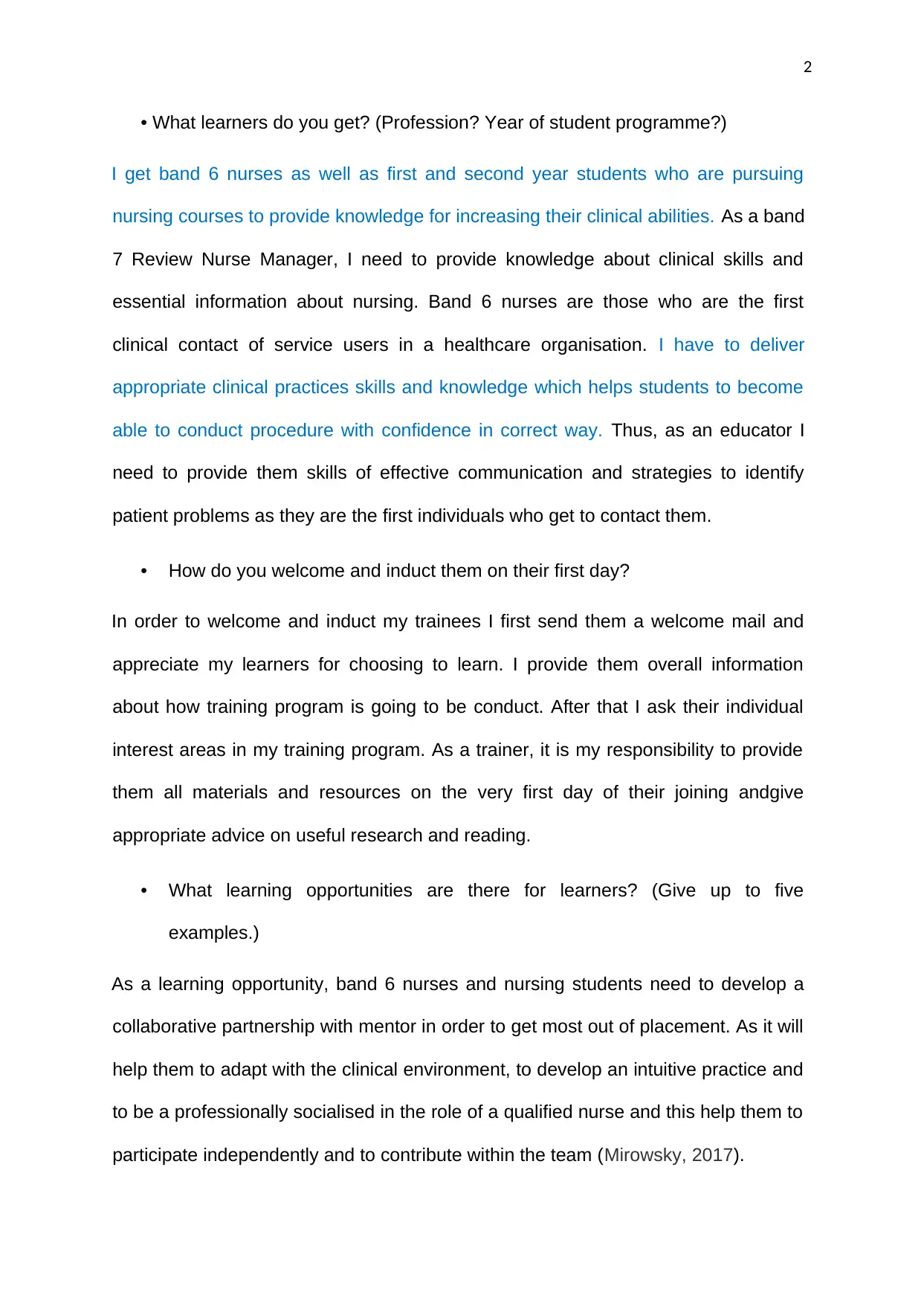
2
• What learners do you get? (Profession? Year of student programme?)
I get band 6 nurses as well as first and second year students who are pursuing
nursing courses to provide knowledge for increasing their clinical abilities. As a band
7 Review Nurse Manager, I need to provide knowledge about clinical skills and
essential information about nursing. Band 6 nurses are those who are the first
clinical contact of service users in a healthcare organisation. I have to deliver
appropriate clinical practices skills and knowledge which helps students to become
able to conduct procedure with confidence in correct way. Thus, as an educator I
need to provide them skills of effective communication and strategies to identify
patient problems as they are the first individuals who get to contact them.
• How do you welcome and induct them on their first day?
In order to welcome and induct my trainees I first send them a welcome mail and
appreciate my learners for choosing to learn. I provide them overall information
about how training program is going to be conduct. After that I ask their individual
interest areas in my training program. As a trainer, it is my responsibility to provide
them all materials and resources on the very first day of their joining andgive
appropriate advice on useful research and reading.
• What learning opportunities are there for learners? (Give up to five
examples.)
As a learning opportunity, band 6 nurses and nursing students need to develop a
collaborative partnership with mentor in order to get most out of placement. As it will
help them to adapt with the clinical environment, to develop an intuitive practice and
to be a professionally socialised in the role of a qualified nurse and this help them to
participate independently and to contribute within the team (Mirowsky, 2017).
• What learners do you get? (Profession? Year of student programme?)
I get band 6 nurses as well as first and second year students who are pursuing
nursing courses to provide knowledge for increasing their clinical abilities. As a band
7 Review Nurse Manager, I need to provide knowledge about clinical skills and
essential information about nursing. Band 6 nurses are those who are the first
clinical contact of service users in a healthcare organisation. I have to deliver
appropriate clinical practices skills and knowledge which helps students to become
able to conduct procedure with confidence in correct way. Thus, as an educator I
need to provide them skills of effective communication and strategies to identify
patient problems as they are the first individuals who get to contact them.
• How do you welcome and induct them on their first day?
In order to welcome and induct my trainees I first send them a welcome mail and
appreciate my learners for choosing to learn. I provide them overall information
about how training program is going to be conduct. After that I ask their individual
interest areas in my training program. As a trainer, it is my responsibility to provide
them all materials and resources on the very first day of their joining andgive
appropriate advice on useful research and reading.
• What learning opportunities are there for learners? (Give up to five
examples.)
As a learning opportunity, band 6 nurses and nursing students need to develop a
collaborative partnership with mentor in order to get most out of placement. As it will
help them to adapt with the clinical environment, to develop an intuitive practice and
to be a professionally socialised in the role of a qualified nurse and this help them to
participate independently and to contribute within the team (Mirowsky, 2017).
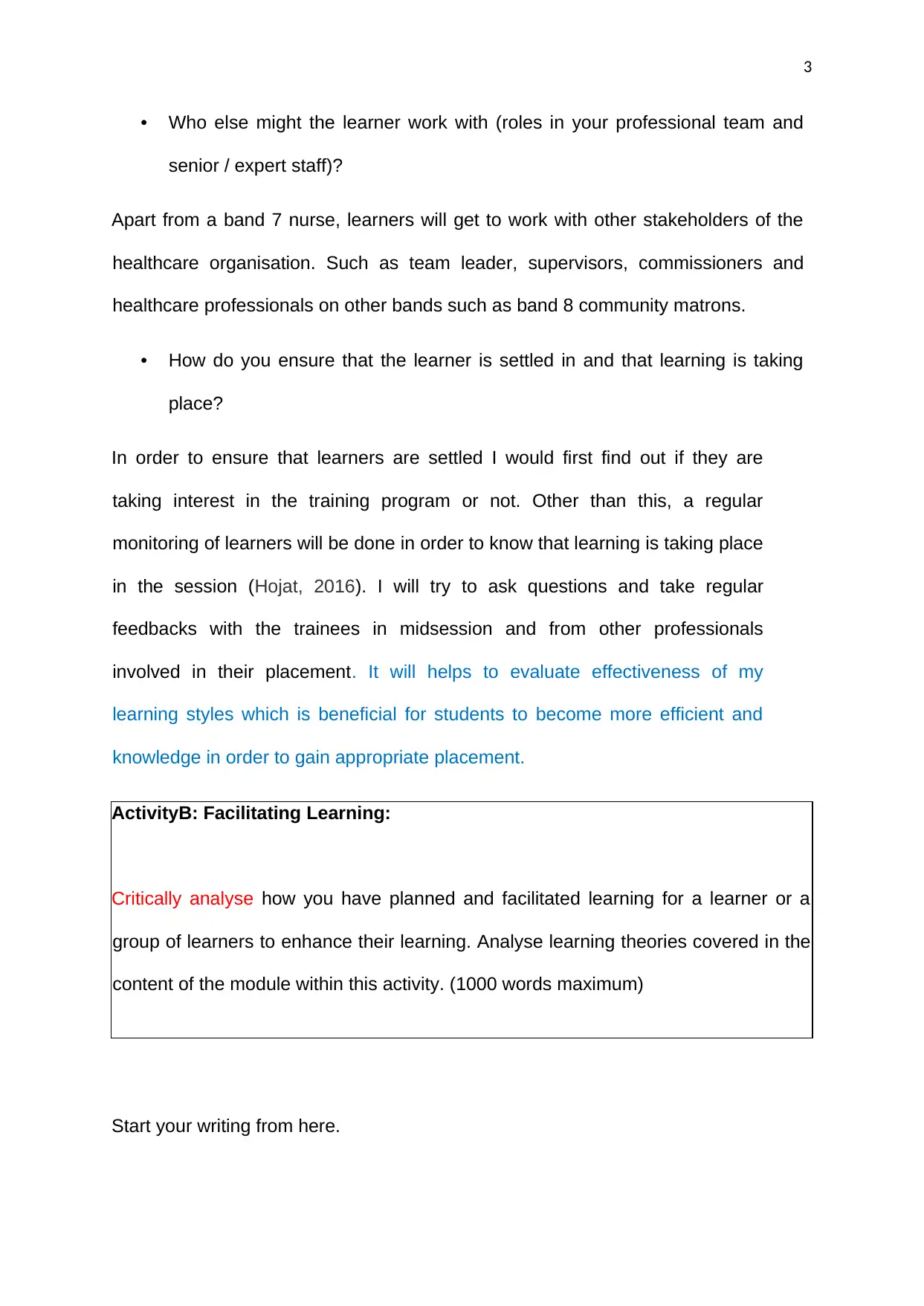
3
• Who else might the learner work with (roles in your professional team and
senior / expert staff)?
Apart from a band 7 nurse, learners will get to work with other stakeholders of the
healthcare organisation. Such as team leader, supervisors, commissioners and
healthcare professionals on other bands such as band 8 community matrons.
• How do you ensure that the learner is settled in and that learning is taking
place?
In order to ensure that learners are settled I would first find out if they are
taking interest in the training program or not. Other than this, a regular
monitoring of learners will be done in order to know that learning is taking place
in the session (Hojat, 2016). I will try to ask questions and take regular
feedbacks with the trainees in midsession and from other professionals
involved in their placement. It will helps to evaluate effectiveness of my
learning styles which is beneficial for students to become more efficient and
knowledge in order to gain appropriate placement.
ActivityB: Facilitating Learning:
Critically analyse how you have planned and facilitated learning for a learner or a
group of learners to enhance their learning. Analyse learning theories covered in the
content of the module within this activity. (1000 words maximum)
Start your writing from here.
• Who else might the learner work with (roles in your professional team and
senior / expert staff)?
Apart from a band 7 nurse, learners will get to work with other stakeholders of the
healthcare organisation. Such as team leader, supervisors, commissioners and
healthcare professionals on other bands such as band 8 community matrons.
• How do you ensure that the learner is settled in and that learning is taking
place?
In order to ensure that learners are settled I would first find out if they are
taking interest in the training program or not. Other than this, a regular
monitoring of learners will be done in order to know that learning is taking place
in the session (Hojat, 2016). I will try to ask questions and take regular
feedbacks with the trainees in midsession and from other professionals
involved in their placement. It will helps to evaluate effectiveness of my
learning styles which is beneficial for students to become more efficient and
knowledge in order to gain appropriate placement.
ActivityB: Facilitating Learning:
Critically analyse how you have planned and facilitated learning for a learner or a
group of learners to enhance their learning. Analyse learning theories covered in the
content of the module within this activity. (1000 words maximum)
Start your writing from here.
⊘ This is a preview!⊘
Do you want full access?
Subscribe today to unlock all pages.

Trusted by 1+ million students worldwide
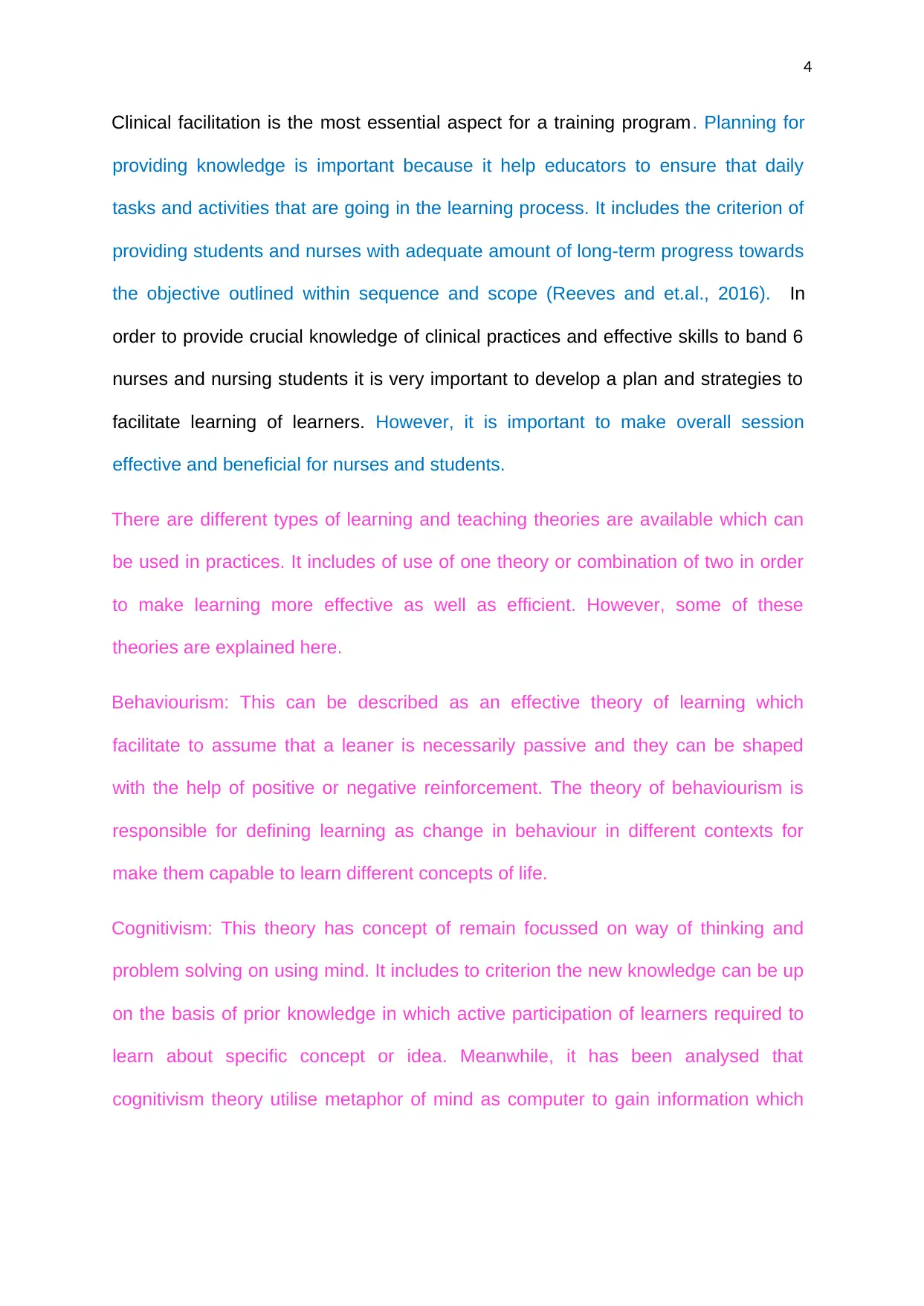
4
Clinical facilitation is the most essential aspect for a training program. Planning for
providing knowledge is important because it help educators to ensure that daily
tasks and activities that are going in the learning process. It includes the criterion of
providing students and nurses with adequate amount of long-term progress towards
the objective outlined within sequence and scope (Reeves and et.al., 2016). In
order to provide crucial knowledge of clinical practices and effective skills to band 6
nurses and nursing students it is very important to develop a plan and strategies to
facilitate learning of learners. However, it is important to make overall session
effective and beneficial for nurses and students.
There are different types of learning and teaching theories are available which can
be used in practices. It includes of use of one theory or combination of two in order
to make learning more effective as well as efficient. However, some of these
theories are explained here.
Behaviourism: This can be described as an effective theory of learning which
facilitate to assume that a leaner is necessarily passive and they can be shaped
with the help of positive or negative reinforcement. The theory of behaviourism is
responsible for defining learning as change in behaviour in different contexts for
make them capable to learn different concepts of life.
Cognitivism: This theory has concept of remain focussed on way of thinking and
problem solving on using mind. It includes to criterion the new knowledge can be up
on the basis of prior knowledge in which active participation of learners required to
learn about specific concept or idea. Meanwhile, it has been analysed that
cognitivism theory utilise metaphor of mind as computer to gain information which
Clinical facilitation is the most essential aspect for a training program. Planning for
providing knowledge is important because it help educators to ensure that daily
tasks and activities that are going in the learning process. It includes the criterion of
providing students and nurses with adequate amount of long-term progress towards
the objective outlined within sequence and scope (Reeves and et.al., 2016). In
order to provide crucial knowledge of clinical practices and effective skills to band 6
nurses and nursing students it is very important to develop a plan and strategies to
facilitate learning of learners. However, it is important to make overall session
effective and beneficial for nurses and students.
There are different types of learning and teaching theories are available which can
be used in practices. It includes of use of one theory or combination of two in order
to make learning more effective as well as efficient. However, some of these
theories are explained here.
Behaviourism: This can be described as an effective theory of learning which
facilitate to assume that a leaner is necessarily passive and they can be shaped
with the help of positive or negative reinforcement. The theory of behaviourism is
responsible for defining learning as change in behaviour in different contexts for
make them capable to learn different concepts of life.
Cognitivism: This theory has concept of remain focussed on way of thinking and
problem solving on using mind. It includes to criterion the new knowledge can be up
on the basis of prior knowledge in which active participation of learners required to
learn about specific concept or idea. Meanwhile, it has been analysed that
cognitivism theory utilise metaphor of mind as computer to gain information which
Paraphrase This Document
Need a fresh take? Get an instant paraphrase of this document with our AI Paraphraser
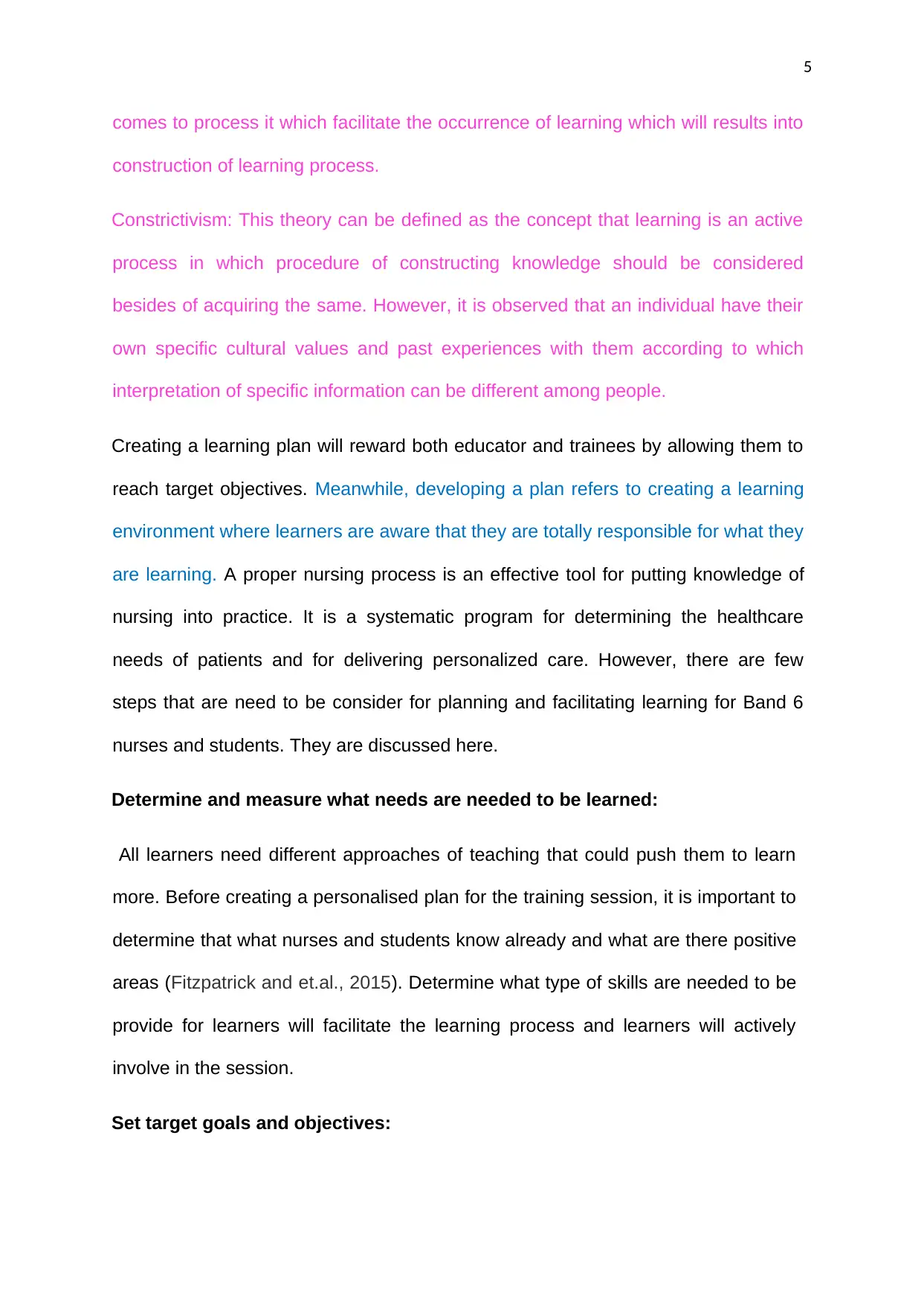
5
comes to process it which facilitate the occurrence of learning which will results into
construction of learning process.
Constrictivism: This theory can be defined as the concept that learning is an active
process in which procedure of constructing knowledge should be considered
besides of acquiring the same. However, it is observed that an individual have their
own specific cultural values and past experiences with them according to which
interpretation of specific information can be different among people.
Creating a learning plan will reward both educator and trainees by allowing them to
reach target objectives. Meanwhile, developing a plan refers to creating a learning
environment where learners are aware that they are totally responsible for what they
are learning. A proper nursing process is an effective tool for putting knowledge of
nursing into practice. It is a systematic program for determining the healthcare
needs of patients and for delivering personalized care. However, there are few
steps that are need to be consider for planning and facilitating learning for Band 6
nurses and students. They are discussed here.
Determine and measure what needs are needed to be learned:
All learners need different approaches of teaching that could push them to learn
more. Before creating a personalised plan for the training session, it is important to
determine that what nurses and students know already and what are there positive
areas (Fitzpatrick and et.al., 2015). Determine what type of skills are needed to be
provide for learners will facilitate the learning process and learners will actively
involve in the session.
Set target goals and objectives:
comes to process it which facilitate the occurrence of learning which will results into
construction of learning process.
Constrictivism: This theory can be defined as the concept that learning is an active
process in which procedure of constructing knowledge should be considered
besides of acquiring the same. However, it is observed that an individual have their
own specific cultural values and past experiences with them according to which
interpretation of specific information can be different among people.
Creating a learning plan will reward both educator and trainees by allowing them to
reach target objectives. Meanwhile, developing a plan refers to creating a learning
environment where learners are aware that they are totally responsible for what they
are learning. A proper nursing process is an effective tool for putting knowledge of
nursing into practice. It is a systematic program for determining the healthcare
needs of patients and for delivering personalized care. However, there are few
steps that are need to be consider for planning and facilitating learning for Band 6
nurses and students. They are discussed here.
Determine and measure what needs are needed to be learned:
All learners need different approaches of teaching that could push them to learn
more. Before creating a personalised plan for the training session, it is important to
determine that what nurses and students know already and what are there positive
areas (Fitzpatrick and et.al., 2015). Determine what type of skills are needed to be
provide for learners will facilitate the learning process and learners will actively
involve in the session.
Set target goals and objectives:
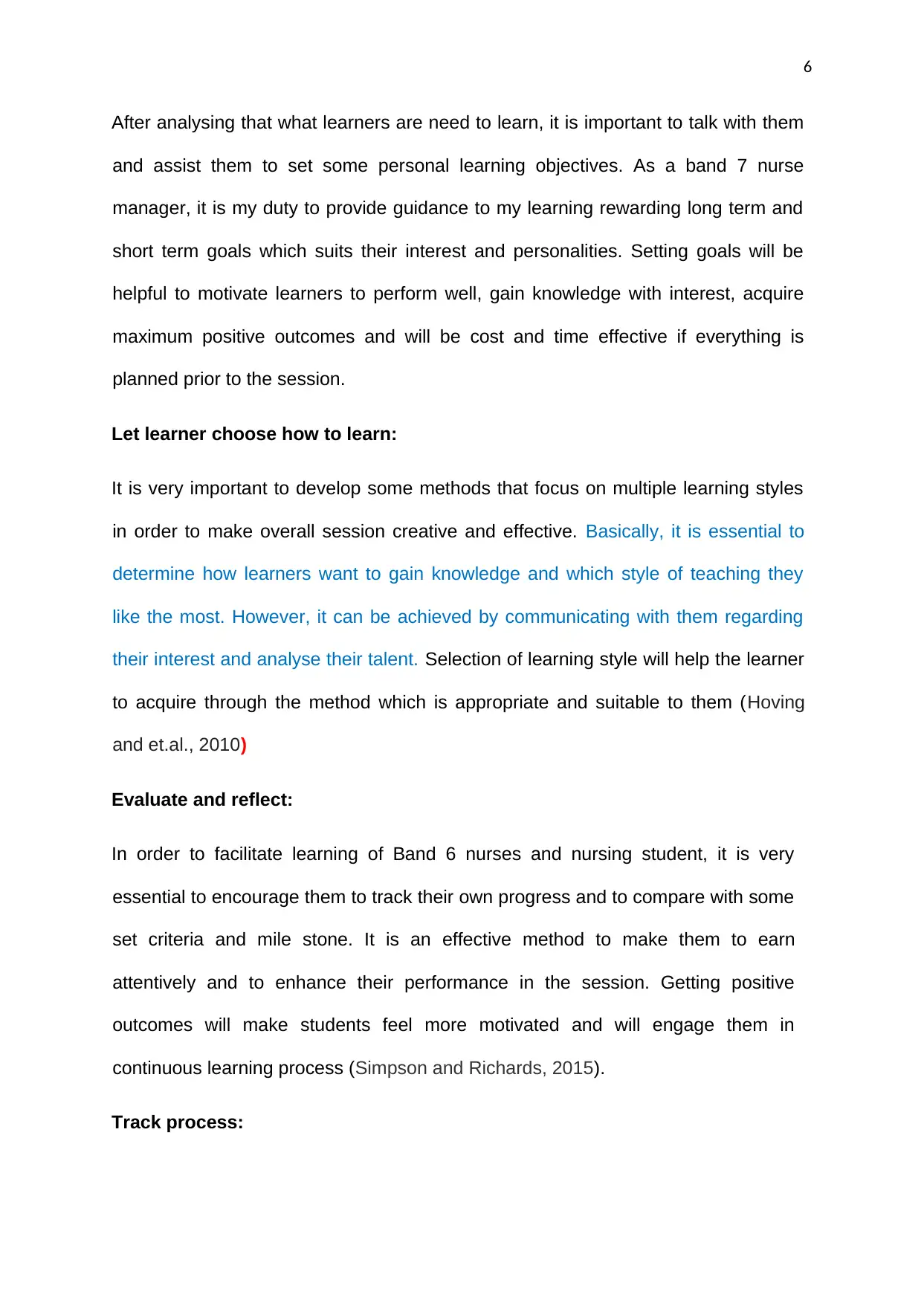
6
After analysing that what learners are need to learn, it is important to talk with them
and assist them to set some personal learning objectives. As a band 7 nurse
manager, it is my duty to provide guidance to my learning rewarding long term and
short term goals which suits their interest and personalities. Setting goals will be
helpful to motivate learners to perform well, gain knowledge with interest, acquire
maximum positive outcomes and will be cost and time effective if everything is
planned prior to the session.
Let learner choose how to learn:
It is very important to develop some methods that focus on multiple learning styles
in order to make overall session creative and effective. Basically, it is essential to
determine how learners want to gain knowledge and which style of teaching they
like the most. However, it can be achieved by communicating with them regarding
their interest and analyse their talent. Selection of learning style will help the learner
to acquire through the method which is appropriate and suitable to them (Hoving
and et.al., 2010)
Evaluate and reflect:
In order to facilitate learning of Band 6 nurses and nursing student, it is very
essential to encourage them to track their own progress and to compare with some
set criteria and mile stone. It is an effective method to make them to earn
attentively and to enhance their performance in the session. Getting positive
outcomes will make students feel more motivated and will engage them in
continuous learning process (Simpson and Richards, 2015).
Track process:
After analysing that what learners are need to learn, it is important to talk with them
and assist them to set some personal learning objectives. As a band 7 nurse
manager, it is my duty to provide guidance to my learning rewarding long term and
short term goals which suits their interest and personalities. Setting goals will be
helpful to motivate learners to perform well, gain knowledge with interest, acquire
maximum positive outcomes and will be cost and time effective if everything is
planned prior to the session.
Let learner choose how to learn:
It is very important to develop some methods that focus on multiple learning styles
in order to make overall session creative and effective. Basically, it is essential to
determine how learners want to gain knowledge and which style of teaching they
like the most. However, it can be achieved by communicating with them regarding
their interest and analyse their talent. Selection of learning style will help the learner
to acquire through the method which is appropriate and suitable to them (Hoving
and et.al., 2010)
Evaluate and reflect:
In order to facilitate learning of Band 6 nurses and nursing student, it is very
essential to encourage them to track their own progress and to compare with some
set criteria and mile stone. It is an effective method to make them to earn
attentively and to enhance their performance in the session. Getting positive
outcomes will make students feel more motivated and will engage them in
continuous learning process (Simpson and Richards, 2015).
Track process:
⊘ This is a preview!⊘
Do you want full access?
Subscribe today to unlock all pages.

Trusted by 1+ million students worldwide
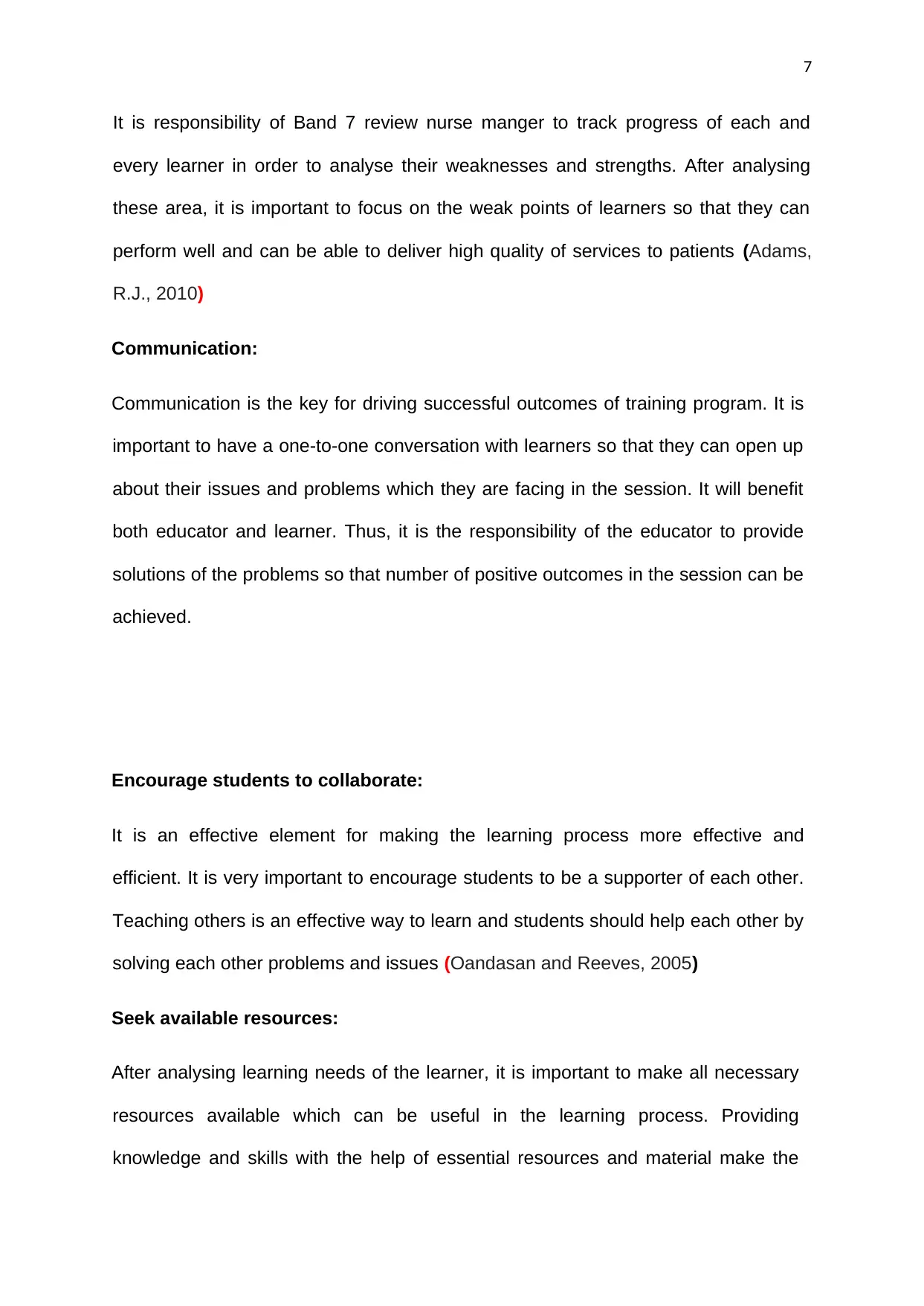
7
It is responsibility of Band 7 review nurse manger to track progress of each and
every learner in order to analyse their weaknesses and strengths. After analysing
these area, it is important to focus on the weak points of learners so that they can
perform well and can be able to deliver high quality of services to patients (Adams,
R.J., 2010)
Communication:
Communication is the key for driving successful outcomes of training program. It is
important to have a one-to-one conversation with learners so that they can open up
about their issues and problems which they are facing in the session. It will benefit
both educator and learner. Thus, it is the responsibility of the educator to provide
solutions of the problems so that number of positive outcomes in the session can be
achieved.
Encourage students to collaborate:
It is an effective element for making the learning process more effective and
efficient. It is very important to encourage students to be a supporter of each other.
Teaching others is an effective way to learn and students should help each other by
solving each other problems and issues (Oandasan and Reeves, 2005)
Seek available resources:
After analysing learning needs of the learner, it is important to make all necessary
resources available which can be useful in the learning process. Providing
knowledge and skills with the help of essential resources and material make the
It is responsibility of Band 7 review nurse manger to track progress of each and
every learner in order to analyse their weaknesses and strengths. After analysing
these area, it is important to focus on the weak points of learners so that they can
perform well and can be able to deliver high quality of services to patients (Adams,
R.J., 2010)
Communication:
Communication is the key for driving successful outcomes of training program. It is
important to have a one-to-one conversation with learners so that they can open up
about their issues and problems which they are facing in the session. It will benefit
both educator and learner. Thus, it is the responsibility of the educator to provide
solutions of the problems so that number of positive outcomes in the session can be
achieved.
Encourage students to collaborate:
It is an effective element for making the learning process more effective and
efficient. It is very important to encourage students to be a supporter of each other.
Teaching others is an effective way to learn and students should help each other by
solving each other problems and issues (Oandasan and Reeves, 2005)
Seek available resources:
After analysing learning needs of the learner, it is important to make all necessary
resources available which can be useful in the learning process. Providing
knowledge and skills with the help of essential resources and material make the
Paraphrase This Document
Need a fresh take? Get an instant paraphrase of this document with our AI Paraphraser
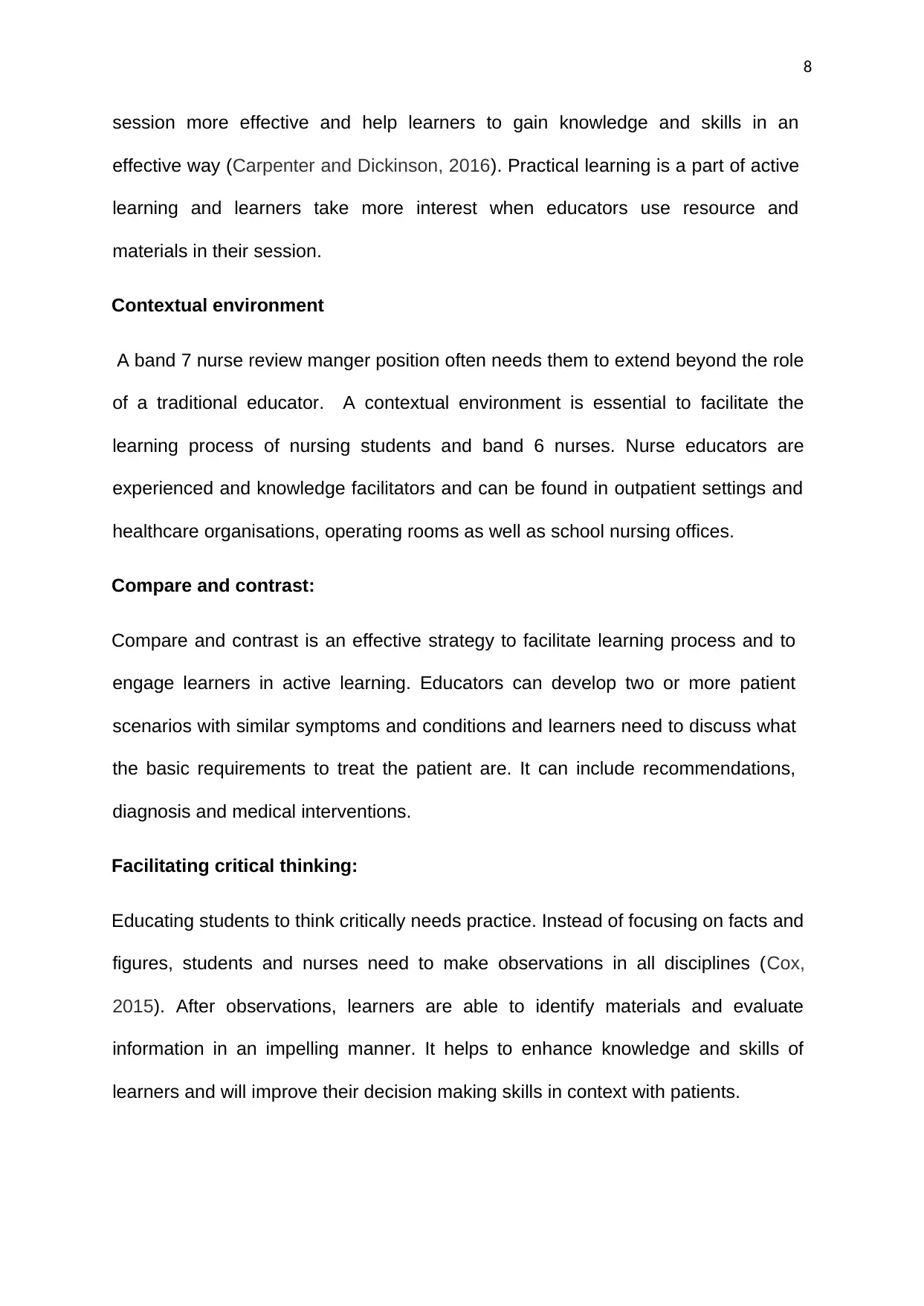
8
session more effective and help learners to gain knowledge and skills in an
effective way (Carpenter and Dickinson, 2016). Practical learning is a part of active
learning and learners take more interest when educators use resource and
materials in their session.
Contextual environment
A band 7 nurse review manger position often needs them to extend beyond the role
of a traditional educator. A contextual environment is essential to facilitate the
learning process of nursing students and band 6 nurses. Nurse educators are
experienced and knowledge facilitators and can be found in outpatient settings and
healthcare organisations, operating rooms as well as school nursing offices.
Compare and contrast:
Compare and contrast is an effective strategy to facilitate learning process and to
engage learners in active learning. Educators can develop two or more patient
scenarios with similar symptoms and conditions and learners need to discuss what
the basic requirements to treat the patient are. It can include recommendations,
diagnosis and medical interventions.
Facilitating critical thinking:
Educating students to think critically needs practice. Instead of focusing on facts and
figures, students and nurses need to make observations in all disciplines (Cox,
2015). After observations, learners are able to identify materials and evaluate
information in an impelling manner. It helps to enhance knowledge and skills of
learners and will improve their decision making skills in context with patients.
session more effective and help learners to gain knowledge and skills in an
effective way (Carpenter and Dickinson, 2016). Practical learning is a part of active
learning and learners take more interest when educators use resource and
materials in their session.
Contextual environment
A band 7 nurse review manger position often needs them to extend beyond the role
of a traditional educator. A contextual environment is essential to facilitate the
learning process of nursing students and band 6 nurses. Nurse educators are
experienced and knowledge facilitators and can be found in outpatient settings and
healthcare organisations, operating rooms as well as school nursing offices.
Compare and contrast:
Compare and contrast is an effective strategy to facilitate learning process and to
engage learners in active learning. Educators can develop two or more patient
scenarios with similar symptoms and conditions and learners need to discuss what
the basic requirements to treat the patient are. It can include recommendations,
diagnosis and medical interventions.
Facilitating critical thinking:
Educating students to think critically needs practice. Instead of focusing on facts and
figures, students and nurses need to make observations in all disciplines (Cox,
2015). After observations, learners are able to identify materials and evaluate
information in an impelling manner. It helps to enhance knowledge and skills of
learners and will improve their decision making skills in context with patients.
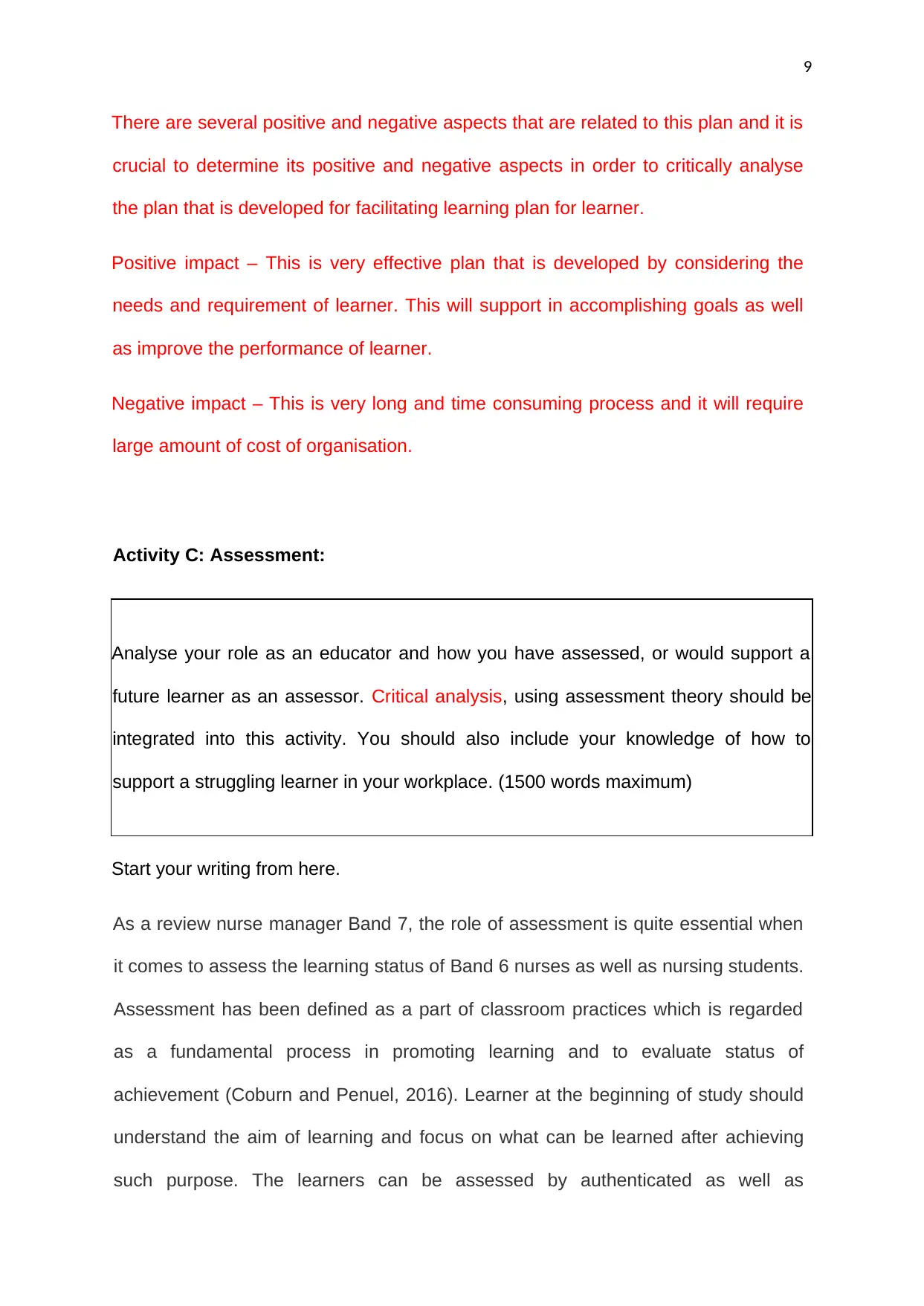
9
There are several positive and negative aspects that are related to this plan and it is
crucial to determine its positive and negative aspects in order to critically analyse
the plan that is developed for facilitating learning plan for learner.
Positive impact – This is very effective plan that is developed by considering the
needs and requirement of learner. This will support in accomplishing goals as well
as improve the performance of learner.
Negative impact – This is very long and time consuming process and it will require
large amount of cost of organisation.
Activity C: Assessment:
Analyse your role as an educator and how you have assessed, or would support a
future learner as an assessor. Critical analysis, using assessment theory should be
integrated into this activity. You should also include your knowledge of how to
support a struggling learner in your workplace. (1500 words maximum)
Start your writing from here.
As a review nurse manager Band 7, the role of assessment is quite essential when
it comes to assess the learning status of Band 6 nurses as well as nursing students.
Assessment has been defined as a part of classroom practices which is regarded
as a fundamental process in promoting learning and to evaluate status of
achievement (Coburn and Penuel, 2016). Learner at the beginning of study should
understand the aim of learning and focus on what can be learned after achieving
such purpose. The learners can be assessed by authenticated as well as
There are several positive and negative aspects that are related to this plan and it is
crucial to determine its positive and negative aspects in order to critically analyse
the plan that is developed for facilitating learning plan for learner.
Positive impact – This is very effective plan that is developed by considering the
needs and requirement of learner. This will support in accomplishing goals as well
as improve the performance of learner.
Negative impact – This is very long and time consuming process and it will require
large amount of cost of organisation.
Activity C: Assessment:
Analyse your role as an educator and how you have assessed, or would support a
future learner as an assessor. Critical analysis, using assessment theory should be
integrated into this activity. You should also include your knowledge of how to
support a struggling learner in your workplace. (1500 words maximum)
Start your writing from here.
As a review nurse manager Band 7, the role of assessment is quite essential when
it comes to assess the learning status of Band 6 nurses as well as nursing students.
Assessment has been defined as a part of classroom practices which is regarded
as a fundamental process in promoting learning and to evaluate status of
achievement (Coburn and Penuel, 2016). Learner at the beginning of study should
understand the aim of learning and focus on what can be learned after achieving
such purpose. The learners can be assessed by authenticated as well as
⊘ This is a preview!⊘
Do you want full access?
Subscribe today to unlock all pages.

Trusted by 1+ million students worldwide
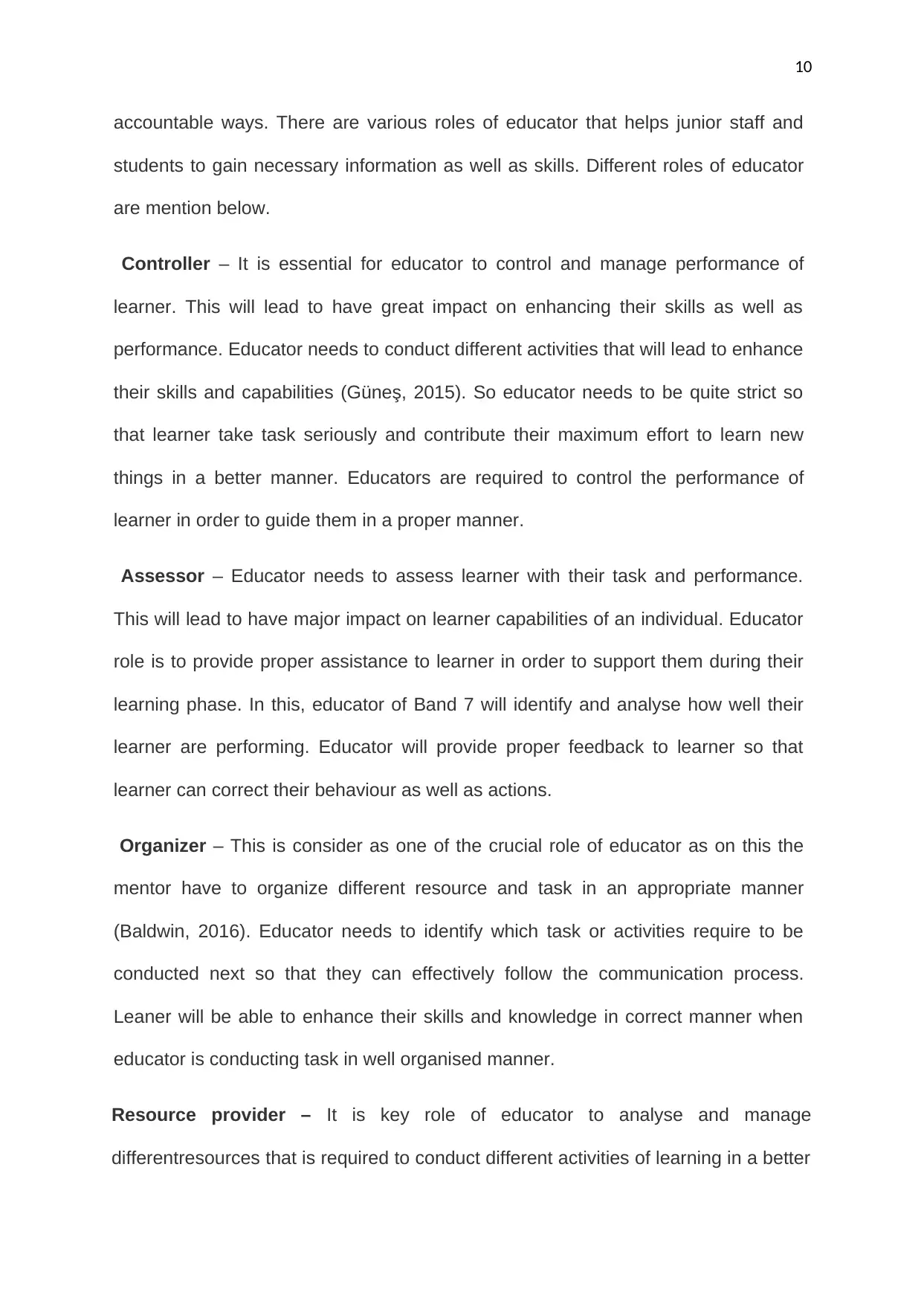
10
accountable ways. There are various roles of educator that helps junior staff and
students to gain necessary information as well as skills. Different roles of educator
are mention below.
Controller – It is essential for educator to control and manage performance of
learner. This will lead to have great impact on enhancing their skills as well as
performance. Educator needs to conduct different activities that will lead to enhance
their skills and capabilities (Güneş, 2015). So educator needs to be quite strict so
that learner take task seriously and contribute their maximum effort to learn new
things in a better manner. Educators are required to control the performance of
learner in order to guide them in a proper manner.
Assessor – Educator needs to assess learner with their task and performance.
This will lead to have major impact on learner capabilities of an individual. Educator
role is to provide proper assistance to learner in order to support them during their
learning phase. In this, educator of Band 7 will identify and analyse how well their
learner are performing. Educator will provide proper feedback to learner so that
learner can correct their behaviour as well as actions.
Organizer – This is consider as one of the crucial role of educator as on this the
mentor have to organize different resource and task in an appropriate manner
(Baldwin, 2016). Educator needs to identify which task or activities require to be
conducted next so that they can effectively follow the communication process.
Leaner will be able to enhance their skills and knowledge in correct manner when
educator is conducting task in well organised manner.
Resource provider – It is key role of educator to analyse and manage
differentresources that is required to conduct different activities of learning in a better
accountable ways. There are various roles of educator that helps junior staff and
students to gain necessary information as well as skills. Different roles of educator
are mention below.
Controller – It is essential for educator to control and manage performance of
learner. This will lead to have great impact on enhancing their skills as well as
performance. Educator needs to conduct different activities that will lead to enhance
their skills and capabilities (Güneş, 2015). So educator needs to be quite strict so
that learner take task seriously and contribute their maximum effort to learn new
things in a better manner. Educators are required to control the performance of
learner in order to guide them in a proper manner.
Assessor – Educator needs to assess learner with their task and performance.
This will lead to have major impact on learner capabilities of an individual. Educator
role is to provide proper assistance to learner in order to support them during their
learning phase. In this, educator of Band 7 will identify and analyse how well their
learner are performing. Educator will provide proper feedback to learner so that
learner can correct their behaviour as well as actions.
Organizer – This is consider as one of the crucial role of educator as on this the
mentor have to organize different resource and task in an appropriate manner
(Baldwin, 2016). Educator needs to identify which task or activities require to be
conducted next so that they can effectively follow the communication process.
Leaner will be able to enhance their skills and knowledge in correct manner when
educator is conducting task in well organised manner.
Resource provider – It is key role of educator to analyse and manage
differentresources that is required to conduct different activities of learning in a better
Paraphrase This Document
Need a fresh take? Get an instant paraphrase of this document with our AI Paraphraser
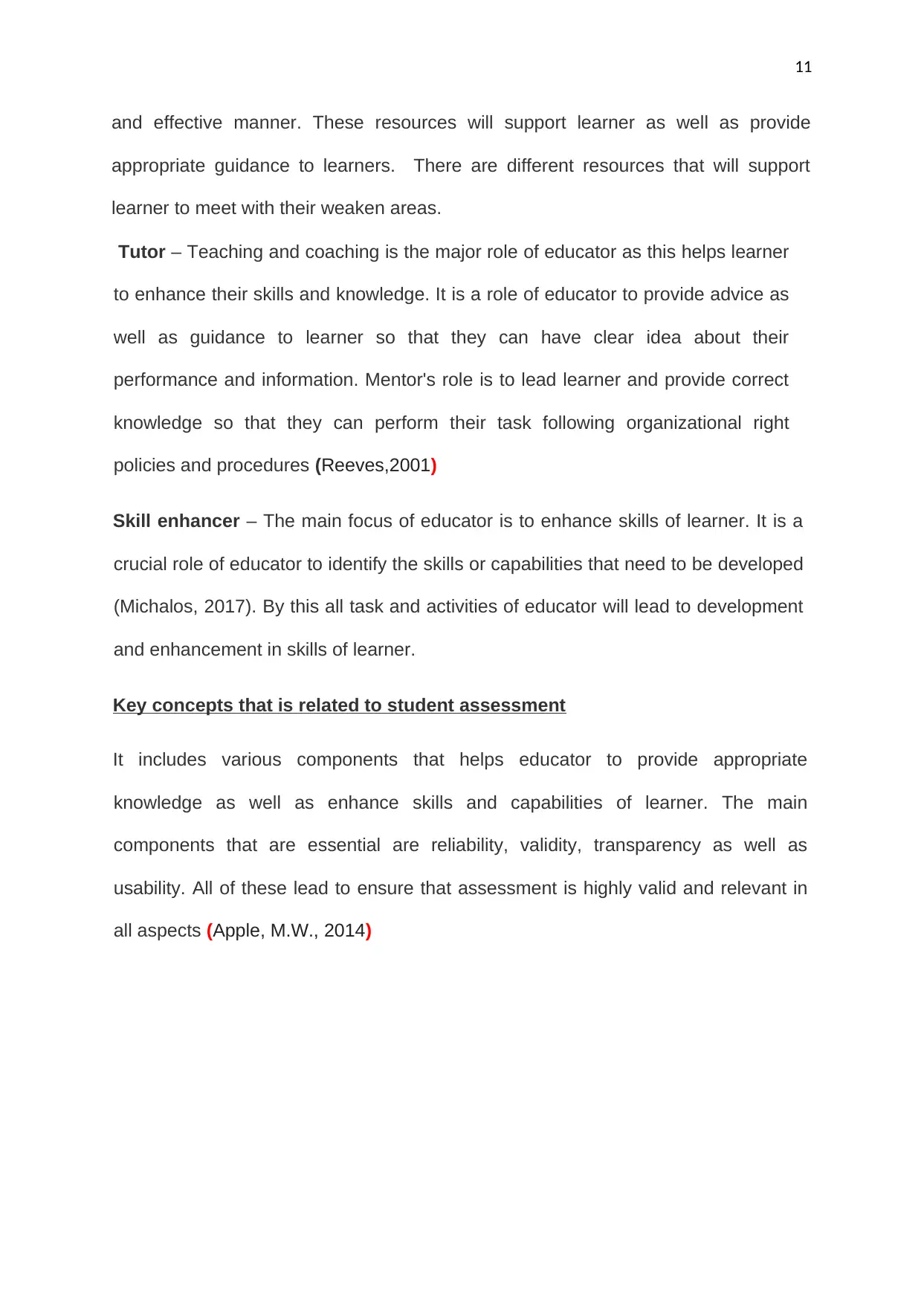
11
and effective manner. These resources will support learner as well as provide
appropriate guidance to learners. There are different resources that will support
learner to meet with their weaken areas.
Tutor – Teaching and coaching is the major role of educator as this helps learner
to enhance their skills and knowledge. It is a role of educator to provide advice as
well as guidance to learner so that they can have clear idea about their
performance and information. Mentor's role is to lead learner and provide correct
knowledge so that they can perform their task following organizational right
policies and procedures (Reeves,2001)
Skill enhancer – The main focus of educator is to enhance skills of learner. It is a
crucial role of educator to identify the skills or capabilities that need to be developed
(Michalos, 2017). By this all task and activities of educator will lead to development
and enhancement in skills of learner.
Key concepts that is related to student assessment
It includes various components that helps educator to provide appropriate
knowledge as well as enhance skills and capabilities of learner. The main
components that are essential are reliability, validity, transparency as well as
usability. All of these lead to ensure that assessment is highly valid and relevant in
all aspects (Apple, M.W., 2014)
and effective manner. These resources will support learner as well as provide
appropriate guidance to learners. There are different resources that will support
learner to meet with their weaken areas.
Tutor – Teaching and coaching is the major role of educator as this helps learner
to enhance their skills and knowledge. It is a role of educator to provide advice as
well as guidance to learner so that they can have clear idea about their
performance and information. Mentor's role is to lead learner and provide correct
knowledge so that they can perform their task following organizational right
policies and procedures (Reeves,2001)
Skill enhancer – The main focus of educator is to enhance skills of learner. It is a
crucial role of educator to identify the skills or capabilities that need to be developed
(Michalos, 2017). By this all task and activities of educator will lead to development
and enhancement in skills of learner.
Key concepts that is related to student assessment
It includes various components that helps educator to provide appropriate
knowledge as well as enhance skills and capabilities of learner. The main
components that are essential are reliability, validity, transparency as well as
usability. All of these lead to ensure that assessment is highly valid and relevant in
all aspects (Apple, M.W., 2014)
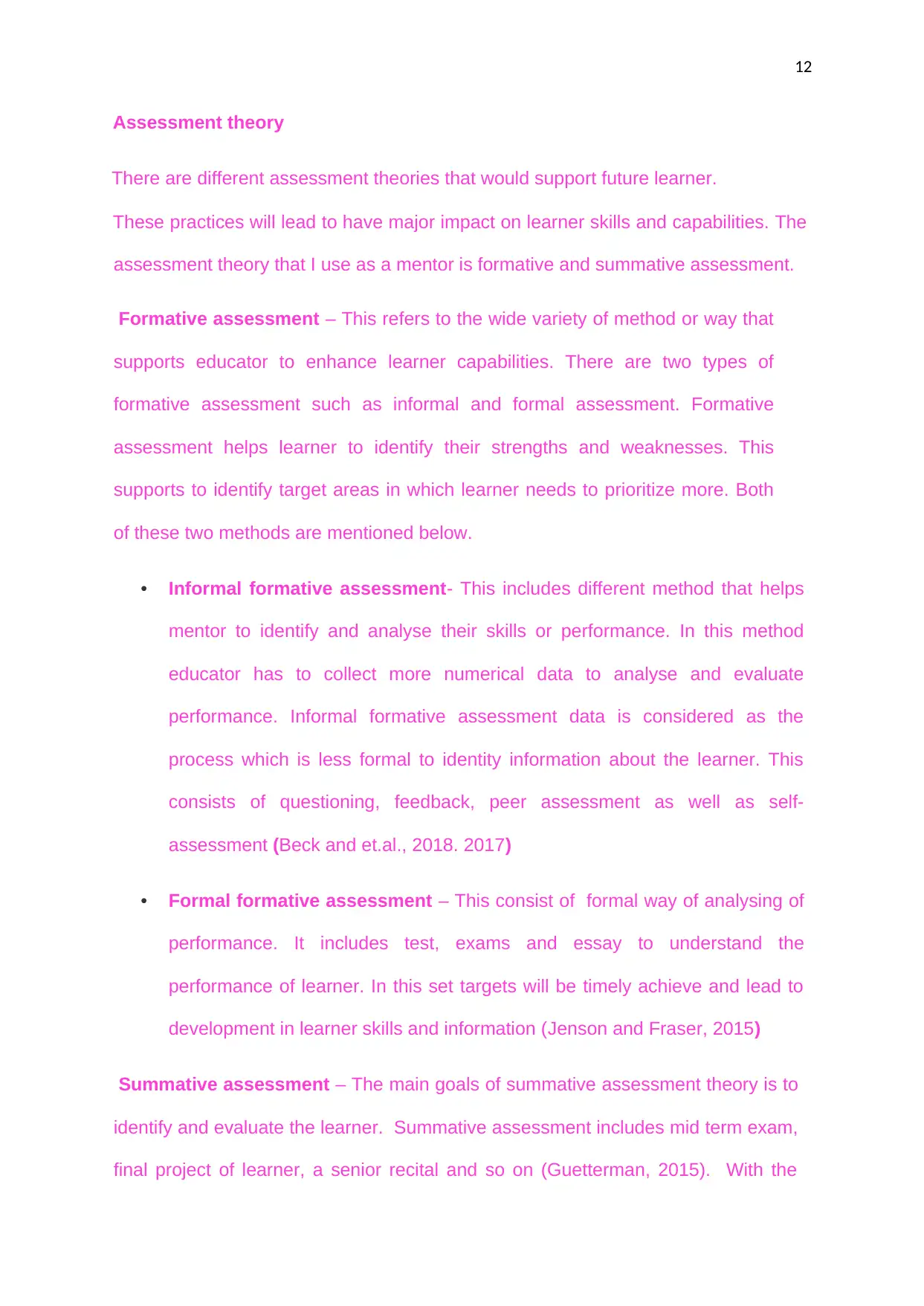
12
Assessment theory
There are different assessment theories that would support future learner.
These practices will lead to have major impact on learner skills and capabilities. The
assessment theory that I use as a mentor is formative and summative assessment.
Formative assessment – This refers to the wide variety of method or way that
supports educator to enhance learner capabilities. There are two types of
formative assessment such as informal and formal assessment. Formative
assessment helps learner to identify their strengths and weaknesses. This
supports to identify target areas in which learner needs to prioritize more. Both
of these two methods are mentioned below.
• Informal formative assessment- This includes different method that helps
mentor to identify and analyse their skills or performance. In this method
educator has to collect more numerical data to analyse and evaluate
performance. Informal formative assessment data is considered as the
process which is less formal to identity information about the learner. This
consists of questioning, feedback, peer assessment as well as self-
assessment (Beck and et.al., 2018. 2017)
• Formal formative assessment – This consist of formal way of analysing of
performance. It includes test, exams and essay to understand the
performance of learner. In this set targets will be timely achieve and lead to
development in learner skills and information (Jenson and Fraser, 2015)
Summative assessment – The main goals of summative assessment theory is to
identify and evaluate the learner. Summative assessment includes mid term exam,
final project of learner, a senior recital and so on (Guetterman, 2015). With the
Assessment theory
There are different assessment theories that would support future learner.
These practices will lead to have major impact on learner skills and capabilities. The
assessment theory that I use as a mentor is formative and summative assessment.
Formative assessment – This refers to the wide variety of method or way that
supports educator to enhance learner capabilities. There are two types of
formative assessment such as informal and formal assessment. Formative
assessment helps learner to identify their strengths and weaknesses. This
supports to identify target areas in which learner needs to prioritize more. Both
of these two methods are mentioned below.
• Informal formative assessment- This includes different method that helps
mentor to identify and analyse their skills or performance. In this method
educator has to collect more numerical data to analyse and evaluate
performance. Informal formative assessment data is considered as the
process which is less formal to identity information about the learner. This
consists of questioning, feedback, peer assessment as well as self-
assessment (Beck and et.al., 2018. 2017)
• Formal formative assessment – This consist of formal way of analysing of
performance. It includes test, exams and essay to understand the
performance of learner. In this set targets will be timely achieve and lead to
development in learner skills and information (Jenson and Fraser, 2015)
Summative assessment – The main goals of summative assessment theory is to
identify and evaluate the learner. Summative assessment includes mid term exam,
final project of learner, a senior recital and so on (Guetterman, 2015). With the
⊘ This is a preview!⊘
Do you want full access?
Subscribe today to unlock all pages.

Trusted by 1+ million students worldwide
1 out of 18
Related Documents
Your All-in-One AI-Powered Toolkit for Academic Success.
+13062052269
info@desklib.com
Available 24*7 on WhatsApp / Email
![[object Object]](/_next/static/media/star-bottom.7253800d.svg)
Unlock your academic potential
Copyright © 2020–2026 A2Z Services. All Rights Reserved. Developed and managed by ZUCOL.




